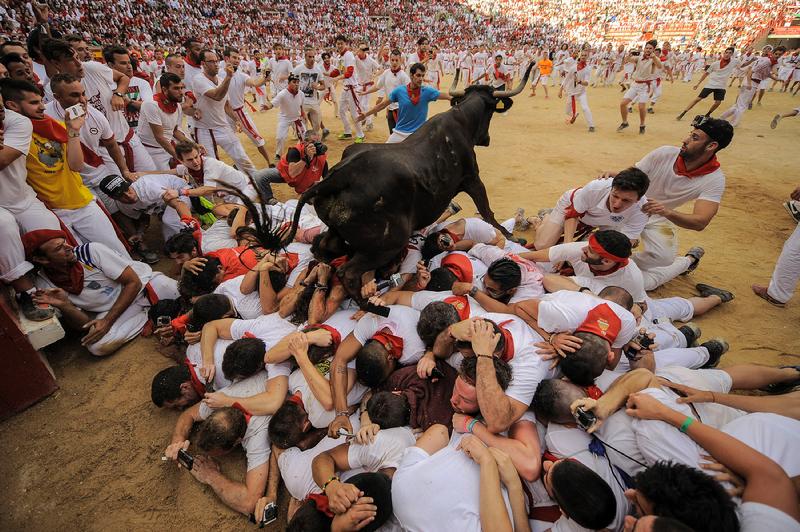
Do you need Spanish to survive San Fermín?
Share
Nervous about visiting Pamplona for the Running of the Bulls festival, or San Fermín, without knowing Spanish? Don't worry! You can easily navigate around Pamplona with little to no background in Spanish. Tens of thousands of English-speaking tourists visit Pamplona every year for the Running of the Bulls festival, and most of these visitors don't know much Spanish beyond "Hola."
To accommodate tourists at the Running of the Bulls festival, most hotels, restaurants, and shops have English-speaking staff, and essential information, including maps and schedules, is typically available in multiple languages. This means that basic communication for directions, ordering food, and understanding key events can be easily managed without fluency in Spanish.
Still, we encourage you to freshen up on your Spanish basics, because knowing some Spanish can significantly enhance your experience! Simple greetings and basic phrases show respect and appreciation for the local culture, which will help you connect with locals and make the most out of the festival.
If you can, spend some time leading up to the festival on Duolingo, and check out this glossary of important Spanish words related to the fiesta:
Glossary of Important Spanish Words for San Fermín
- Encierro - The Running of the Bulls
- Toro - Bull
- Cornada - Goring from a bull's horn
- Chupinazo - The opening rocket (official start of the festival)
- Pobre de Mí - The closing ceremony song, signaling the end of the festival
- Corrida de Toros - Bullfight
- Calle - Street
- Vallado - Fence or barricade enclosing the bull run
- Comparsa - A parade of gigantes and "big-head" figures
- Peña - Social clubs or groups that play a big part in the festivities
- Faja - Red sash worn around the waist
- Pañuelo - Red handkerchief worn around the neck
- Fiesta - Party or celebration
- Procesión - Procession, often religious
- Vaquilla - A smaller bull or cow used in some events
- Ayuntamiento - Town Hall
- Fuegos Artificiales - Fireworks
Safety Considerations
Understanding safety instructions during the Running of the Bulls or other crowded events is crucial. While many signs and announcements are bilingual, having a grasp of Spanish can ensure you do not miss important information, such as emergency exits, safety warnings, and first aid locations. Here are some safety-related terms to learn before the festival:
- Ayuda - Help
- Emergencia - Emergency
- Policía - Police
- Enfermería - Infirmary
- Primeros Auxilios - First Aid
- Salida de Emergencia - Emergency Exit
- Peligro - Danger
- Cuidado - Be Careful
- Prohibido - Prohibited/Forbidden
- Desalojo - Evacuation
- Atención - Attention
- Médico - Doctor or medic
- Hospital - Hospital
- ¿Puede ayudarme, por favor? - Can you help me, please?
- ¿Puedes llamar a una ambulancia? - Can you call an ambulance?
